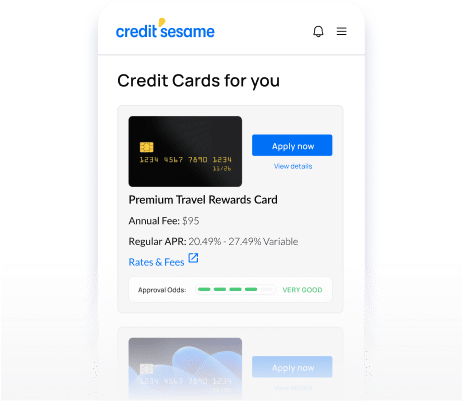How do car loans work?

Find the right loan for you
Gain access to personalized loan recommendations based on your credit profile and approval odds. 100% free.
By clicking on the button above, you agree to the Credit Sesame Terms of Use and Privacy Policy.
- ON THIS PAGE
- The fundamentals of car loans
- Auto loan terms worth knowing
- How the monthly payment is set
- How loans differ for new and used cars
- Types of car loans
- Where can I apply for a car loan?
- How do I apply for a car loan?
- How do I qualify for a car loan?
- Does financing a car loan hurt your credit?
- What happens if I pay off my car loan early?
- In a nutshell
Share this
The fundamentals of car loans
Funds from auto loans are distributed to the dealership or seller as a lump sum, which the borrower pays back with interest over time through a monthly payment. That monthly amount is important for most buyers because it helps them determine how much they can afford.
- Loan amount
- Interest rate
- Loan term, or how much time it will take to repay the loan
Loan amount
You can lower the amount of money you borrow by making a big down payment or trading in a car you own. The loan amount, also called the amount financed, is usually based on your income and ability to repay the loan.
Interest rate
The interest rate paid on the loan is usually called the annual percentage rate, or APR. The effective interest rate paid on the loan is given as a yearly percentage.
Loan term
The loan term is the length of time you have to pay back the loan, which can range from 24 to 84 months.
Auto loan terms worth knowing
- Down payment: Money you pay upfront toward the cost of the car, which lowers your loan amount. A down payment can come from cash, the value of a vehicle trade-in, or both.
- Monthly payment: The amount you pay each month on the loan. It includes principal, interest, and possibly fees.
- Principal: Amount borrowed minus fees, penalties, interest, and other costs.
- Total cost: The sum of principal and interest paid over the life of the loan.
- Payoff: This is similar to the total cost of a loan. The payoff is the final amount needed to fully pay off the loan, after which you receive the vehicle title and fully own the vehicle.
- Lender: The financial institution lending you the money for the car. It can be a bank, financing company, credit union, or financing through an auto dealership.
How the monthly payment is set
The monthly payment is set based on the three factors we listed earlier: loan amount, interest rate, and loan length. If any of them increases or decreases, the monthly payment can also increase or decrease.
Here are examples of how changing each can affect your payment, based on a 4-year loan at 3% APR for a car that costs $25,000. Note these are examples to illustrate how car loans work. Actual loan amounts, interest rates, and terms may differ.
Lower loan amount
Negotiating a $2,000 price reduction or making a $2,000 down payment lowers the loan amount to $23,000. Assuming an interest rate of 3%, the monthly payment drops from $553 for a $25,000 loan to $509 for a $23,000 loan.
Lower APR
An APR of 2% instead of 3% reduces interest payments on a $25,000 4-year loan by $11 per month, which amounts to $528 saved over the loan’s life.
Longer loan term
A longer loan term can make monthly auto loan payments easier to afford, but the lower payment means paying more interest over the life of the loan.
Extending the loan from four to five years lowers the monthly payment to $449, saving $104 each month. However, you pay $392 more in total interest over the longer loan period.
How loans differ for new and used cars
A used car usually costs a lot less than a new one, and just that factor can lead to used car loans having shorter loan periods. That can leave you saying goodbye to car payments months, if not a year or more, earlier than you would with a loan for a new car.
Generally, interest rates on used car loans are higher than for new cars. This is in part because a used car’s value is more uncertain and because lenders know used car borrowers default more often on their auto loans, regardless of their credit.
New cars experience a significant depreciation hit early in their ownership, around 10-20% in the first year. This means the car’s value drops quickly, and you could owe more on the loan than the car is worth. This is known as being upside down on the loan.
Types of car loans
There are two types of car loans: new and used. You can also get a car loan to buy out a lease or refinance an existing loan.
An auto lease buyout lets you buy the car you’re already driving from the leasing company for a predetermined price. The APR on a lease buyout loan is typically higher than on a new-car purchase.
Car loans can be refinanced whenever you want, though some lenders may require you to wait six months or longer after buying a vehicle. If you can find a lower interest rate and shorter loan term, refinancing can help you keep more money in your pocket each month.
Refinancing by extending the loan term reduces your payments, but you may pay more interest in the long run.
Where can I apply for a car loan?
Like most loans, it can pay to shop for the best type of auto financing that fits your needs. Compare interest rates and loan length for the same loan amount, along with fees and any other costs at lenders such as:
- Banks
- Credit unions
- Auto dealers
- Online lenders
- Personal loan
- Family members
Direct financing is a bank loan or loan through a professional lender without going through an auto dealership. Dealer financing is through an auto dealer, which will help you find financing through several partner lenders it works with. The dealer doesn’t provide the loan.
Dealer financing is often more expensive than direct financing. A markup is often added to the interest rate you’ll pay, which is a commission to the dealership. Other incentives from the dealer may make it worthwhile, however.
How do I apply for a car loan?
Applying for a car loan is usually pretty straightforward. You’ll start by filling out a loan application online or in person, providing information about yourself and your finances so a lender can determine how much of a credit risk you are and what interest rate and loan terms it will offer you.
An application will typically ask for such information as:
- Social Security number
- Photo ID with your signature on it
- Current and past addresses
- Current and past employment information
- Total income
- Proof of income, such as pay stubs or W-2 forms
- Information on other debts
- Proof of auto insurance
- Registration for a trade-in vehicle
- Permission for a soft pull of your credit
A soft pull of your credit won’t affect your credit scores. It can lead to preapproval and a more full application, which will usually lead to a hard inquiry on your credit that can lower your credit score for a while.
How do I qualify for a car loan?
Having a job, not much debt, and a down payment or trade-in can help you qualify for a car loan. Your credit score is also important to get the best rates and terms.
Even if you don’t have good credit, there are plenty of lenders willing to help you find a loan you qualify for.
It’s a good idea to check your credit scores before applying for a loan. Doing this a few months before you buy can give you time to raise your score.
Interest rates on car loans generally rise as credit scores drop.
- Excellent credit of 750 or higher: lowest interest rate
- Good credit of 700-749: 9.92%
- Fair credit of 600-699: 15.05%
- Bad credit of 451-599: 20.83%
- Deep subprime credit of 450 or lower: highest interest rate
Does financing a car loan hurt your credit?
After a slight drop in your credit score from a hard pull to your credit during the application process, your credit score could drop slightly more because a new loan changes your credit utilization ratio. That’s related to the amount of debt you have, which just got bigger with an auto loan. With regular on-time payments, your credit utilization and loan balance will decrease.
Payment history is the biggest factor in credit scores, so yours should increase if you make the first few loan payments on time. Keep this habit up, and your score should continue to rise.
An auto loan is an installment type of loan, and adding that to your credit mix can improve your score if you don’t already have an installment loan on your report. A diverse credit portfolio shows that you can manage different types of credit.


What happens if I pay off my car loan early?
Paying off a car loan early will help you save on interest, which is the biggest cost of a loan. Closing the account by paying off the loan may lower your credit score, though you may be better off financially by owning your car outright without a loan.
Still, you may want to keep the loan for the full loan term and continue paying it off each month because open lines of credit can help improve your credit history.
If you want to pay off your car loan early, check with the lender or your financing documents to see if there’s a prepayment penalty. Some lenders charge prepayment penalties because they’ll no longer make money from interest payments if you pay off the loan early. Check if the penalty is more than the interest you’d pay over the rest of the loan.
If the loan charges you a simple interest rate, which is calculated monthly based on what you still owe, paying off the loan early means you won’t have to pay the interest that would have accrued over the remainder of the loan.
A precomputed rate is set at the start of your contract and remains a fixed amount for the entire loan. Paying the loan off early won’t affect the interest paid in a precomputed rate loan.
In a nutshell
An auto loan can be a convenient option for financing a new or used car, especially if you don't have much cash saved up front. Making on-time payments on your auto loan builds your credit history, demonstrating financial responsibility to future lenders. Additionally, the limitations of an auto loan, specifically the maximum amount you qualify for, can serve as a helpful guide for setting a realistic budget for your car purchase.
Vehicle loans offer a financing option to spread the cost of a car purchase. Careful planning is key. Secure the lowest interest rate possible and choose a loan term that balances affordability with minimizing interest costs. Responsible repayment builds credit history, a valuable asset for your financial future.

Get approved for the right loan
See loans with the highest chance of approval based on your credit profile
By clicking on the button above, you agree to the Credit Sesame Terms of Use and Privacy Policy.
Share this
More related articles

Ready to find the right loan?
Fixed and variable rates
Reporting to credit bureaus
How to improve credit score
See your score.
Get the right loan options.
See your score. Get the right loan options.
See cards with the highest chance of approval based on your credit profile
By clicking on the button above, you agree to the Credit Sesame Terms of Use and Privacy Policy.















